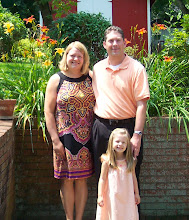Welcome to the fourth week of our book study through Ginger Plowman’s Don’t Make Me Count To Three! This was the last chapter in Part I of our book. If you didn’t read, no worries! Just join along with us anytime. It’s quick and easy to get caught up.
For me, this was one of the most eye-opening chapters of the book. All too often I find myself correcting and/or punishing Grace’s sinful behavior, having her ask forgiveness, and moving on. This leaves out a vital step…training in righteousness. I should always model for her what a biblical response should have been and make her practice that response.
My favorite quote from this chapter is on pg. 48:
“As a rule, anytime you correct your child for wrong behavior, have him walk through the right behavior. This is how we train our children to walk in the righteousness of Christ.”
This takes a lot of time. However, Lord willing, we will hopefully see lasting improvement over time as our kids learn to think like Christ.
I loved the section about being a “tattletale.” In a wise and practical application of Matthew 18, Ginger suggests ways to handle conflict between children. Grace is an only child, so I don’t deal with this problem as much as other parents might. However, I’ll admit that Grace is quick to run to me when problems arise with other children on play dates, when I babysit, etc. Biblical conflict resolution is such an important skill to teach our kids…they will use it their whole lives. This is something I’m focusing on right now with our daughter. Instead of having the victim mentality, we want her to be confident enough to try to resolve the problem on her own first. God’s plan is so wise.
The role-playing section was a good example of HOW we train our children in righteousness. Let’s face it…kids tune out their parents’ voices, and words are often forgotten. They are much more likely to remember what to do if they practice it frequently. With Grace, I have even role-played different conflict scenarios when we are playing with dolls or stuffed animals. I think she internalizes it more when she’s not in an emotional state!
I hope that many of you will join in and comment on what particularly struck you in this week’s reading. Even if you didn’t read, feel free to comment below on the topics raised. Perhaps consider one or more of the following questions:
Why is it important to show our kids how they should have responded instead of sinning? How do you handle conflict resolution between siblings and/or peers? Do you use role-playing and does it seem to help?
I look forward to reading your comments! This week we begin Part II of Ginger’s book, which will help us focus on what biblical reproof looks like. Stay tuned for a post next Monday on chapter five.




















6 comments:
This was a very valuable chapter in my opinion. The concept of training your children in the right behavior is one that I came to a little late. Often our discipline includes depriving a child of a particular privelidge or activity as part of the consequences (especially by those who do not advocate spanking). I had a very wise man tell me once that instead of taking the priveledge away, you need to put them right back in the situation and make them walk through it in the right way. The example he gave was for an older child, but I think it helps to make the point: If you have told a child they may have 30 minutes to play a game, and when that time is up they continue to play, or throw a fit, our tendency is to say,"If you can't play with it properly, then you may not play with it at all." Instead, we should discipline, discuss right behavior, and then put them right back in the situation - when the 30 minutes is up, then they must respond correctly, or the process is started all over again. This is true with conflicts with other children as well. Don't remove them, put them back into the situation with instruction on how they are supposed to act and make them walk through right behavior. Excellent training.
I also liked the approach to dealing with tattling. To tell a child not to tattle on its own gives them no avenue for being rescued from a bad situation. On the other hand, whining about everything is also not appropriate. Showing them the biblical approach to dealing with these issues gives them the balance between trying to handle things on their own without leaving them feeling helpless when they are unable to protect themselves.
Joanna, your statement about thinking I was so cool cracked me up - I keep trying to convince my kids that I am a cool mom, and they aren't buying it!
Forgive me if I’m repeating something Ginger said--I haven’t read the book, but concerning training the child in righteousness, you mentioned walking the child through the proper way to respond to a situation. That is exactly right. God commands this of us in Eph. 4:22-32. We are to put off the old and put on the new, lay aside falsehood and speak truth, don’t steal rather labor and share, no unwholesome words rather edifying words, no bitterness, etc. rather forgiveness. If we only try to stop doing the wrong without doing the right, we are no more than Pharisees. We are to discipline ourselves for the purpose of godliness and we’ve been given the awesome, weighty responsibility to train our children as well. The motive of this discipline for godliness is 4:32, “just as God in Christ also has forgiven you.” And, 5:2, “just as Christ also loved you, and gave Himself up for us…” We are to always remember the cross. And this is our goal that our children will as well.
Deanna,
I appreciate your wisdom. I'm glad you brought up the idea of teaching how to deal biblically with conflict so we won't leave our kids "feeling helpless when they are unable to protect themselves."
I already see some victim tendencies in Grace (whining, helplessness, and some separation anxiety). Part of me is thankful that she has a more gentle and quiet spirit rather than being loud and aggressive. However, she needs to learn to solve problems (and conflicts) on her own whenever possible. God's plan for this is so wise and so clear in the scriptures.
I'm a worrier and slightly paranoid by nature, which doesn't really mix well with her tendencies, so I'm working on this as well. I think I've seen and heard too many terrible things working as a counselor.
It's amazing how many issues we have to deal with in our own hearts when raising our children.
Mom (Mimi),
For someone who hasn't read the book, you made the same point as Ginger! She also used the verses from Ephesians 4 to support her thinking. Maybe you should write your own book: "Raising Children Under the Shadow of the Cross" or "Christ-Centered Discipline for Parents" or (my favorite) "Miss Debbie's Discipline Do's and Don'ts."
Love you!
I have been keeping up with the reading. I am not managing to find time to post comments in a timely manner though.
I LOVE this book. I have recommended it to many friends, who have also read Ted Tripp's book Shepherding a Child's Heart. Ginger's book is very practical, and such a quick read that you can grab it when you need an instant reminder of how to train your child's heart.
Chapter 4 reminded me to walk through the right way to do things. We have been putting this into practice over the last two weeks, and the results have been amazing. After a time of reproof, and discussing the correct actions, my 4 year old sought out his friend and ,unprompted, apologized and tried the correct way. I was stunned.
I think too many times we have stopped at the discipline part, and have neglected to give him a way out of the situation. What has been frustrating is the need to do it repeatedly. Then I read chapter 5, in which she states that I can't just train him once, and expect he will remember it.
I have been struck by the fact that we are trying to train sinful hearts to act Godly. It seems the process of training will be a little less like banging my head against a brick wall, once my children's hearts are clean in the sight of God. That is not to say all discipline and correction will stop, I just have to look in the mirror to know that isn't true, but the heart will be clean, and there should be a desire to do what is right to please God out of the love they have for HIM. Does that logic make sense?
Christa,
I'm so glad you are finding this book useful. It has really helped me, and it seems that every time I read it, disciplining in a biblical way becomes more ingrained in me. Kind of like the Gumnazo principle!
Post a Comment